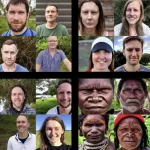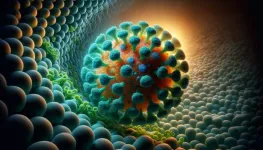(Press-News.org) What does a person look like? If you use the popular artificial intelligence image generator Stable Diffusion to conjure answers, too frequently you’ll see images of light-skinned men.
Stable Diffusion’s perpetuation of this harmful stereotype is among the findings of a new University of Washington study. Researchers also found that, when prompted to create images of “a person from Oceania,” for instance, Stable Diffusion failed to equitably represent Indigenous peoples. Finally, the generator tended to sexualize images of women from certain Latin American countries (Colombia, Venezuela, Peru) as well as those from Mexico, India and Egypt.
The researchers will present their findings the week of Dec. 6 at the 2023 Conference on Empirical Methods in Natural Language Processing in Singapore.
“It’s important to recognize that systems like Stable Diffusion produce results that can cause harm,” said Sourojit Ghosh, a UW doctoral student in the human centered design and engineering department. “There is a near-complete erasure of nonbinary and Indigenous identities. For instance, an Indigenous person looking at Stable Diffusion’s representation of people from Australia is not going to see their identity represented — that can be harmful and perpetuate stereotypes of the settler-colonial white people being more ‘Australian’ than Indigenous, darker-skinned people, whose land it originally was and continues to remain.”
To study how Stable Diffusion portrays people, researchers asked the text-to-image generator to create 50 images of a “front-facing photo of a person.” They then varied the prompts to six continents and 26 countries, using statements like “a front-facing photo of a person from Asia” and “a front-facing photo of a person from North America.” They did the same with gender. For example, they compared “person” to “man” and “person from India” to “person of nonbinary gender from India.”
The team took the generated images and analyzed them computationally, assigning each a score: A number closer to 0 suggests less similarity while a number closer to 1 suggests more. The researchers then confirmed the computational results manually. They found that images of a “person” corresponded most with men (0.64) and people from Europe (0.71) and North America (0.68), while corresponding least with nonbinary people (0.41) and people from Africa (0.41) and Asia (0.43).
Likewise, images of a person from Oceania corresponded most closely with people from majority-white countries Australia (0.77) and New Zealand (0.74), and least with people from Papua New Guinea (0.31), the second most populous country in the region where the population remains predominantly Indigenous.
A third finding announced itself as researchers were working on the study: Stable Diffusion was sexualizing certain women of color, especially Latin American women. So the team compared images using a NSFW (Not Safe for Work) Detector, a machine-learning model that can identify sexualized images, labeling them on a scale from “sexy” to “neutral.” (The detector has a history of being less sensitive to NSFW images than humans.) A woman from Venezuela had a “sexy” score of 0.77 while a woman from Japan ranked 0.13 and a woman from the United Kingdom 0.16.
“We weren’t looking for this, but it sort of hit us in the face,” Ghosh said. “Stable Diffusion censored some images on its own and said, ‘These are Not Safe for Work.’ But even some that it did show us were Not Safe for Work, compared to images of women in other countries in Asia or the U.S. and Canada.”
While the team’s work points to clear representational problems, the ways to fix them are less clear.
“We need to better understand the impact of social practices in creating and perpetuating such results,” Ghosh said. “To say that ‘better’ data can solve these issues misses a lot of nuance. A lot of why Stable Diffusion continually associates ‘person’ with ‘man’ comes from the societal interchangeability of those terms over generations.”
The team chose to study Stable Diffusion, in part, because it’s open source and makes its training data available (unlike prominent competitor Dall-E, from ChatGPT-maker OpenAI). Yet both the reams of training data fed to the models and the people training the models themselves introduce complex networks of biases that are difficult to disentangle at scale.
“We have a significant theoretical and practical problem here,” said Aylin Caliskan, a UW assistant professor in the Information School. “Machine learning models are data hungry. When it comes to underrepresented and historically disadvantaged groups, we do not have as much data, so the algorithms cannot learn accurate representations. Moreover, whatever data we tend to have about these groups is stereotypical. So we end up with these systems that not only reflect but amplify the problems in society.”
To that end, the researchers decided to include in the published paper only blurred copies of images that sexualized women of color.
“When these images are disseminated on the internet, without blurring or marking that they are synthetic images, they end up in the training data sets of future AI models,” Caliskan said. “It contributes to this entire problematic cycle. AI presents many opportunities, but it is moving so fast that we are not able to fix the problems in time and they keep growing rapidly and exponentially.”
This research was funded by a National Institute of Standards and Technology award.
For more information, contact Ghosh at ghosh100@uw.edu and Caliskan at aylin@uw.edu.
END
AI image generator Stable Diffusion perpetuates racial and gendered stereotypes, study finds
2023-11-29
ELSE PRESS RELEASES FROM THIS DATE:
ORNL joins consortium to tackle scientific AI’s next great milestone
2023-11-29
The Department of Energy’s Oak Ridge National Laboratory has joined a global consortium of scientists from federal laboratories, research institutes, academia and industry to address the challenges of building large-scale artificial intelligence systems and advancing trustworthy and reliable AI for scientific discovery.
The partnership, known as the Trillion Parameter Consortium, or TPC, seeks to grow and improve large-scale generative AI models aimed at tackling complex scientific challenges. These include the development of scalable model architectures and related training strategies, as well as data organization ...
UT Health San Antonio launches Center for Global and Community Oral Health
2023-11-29
The School of Dentistry of The University of Texas Health Science Center at San Antonio has launched the Center for Global and Community Oral Health, designed to bring together various existing outreach and research programs under one umbrella to study and develop solutions to the most pressing dental challenges facing the global population.
“Our vision is to transform community and global oral health through education, research and innovation,” said Brij B. Singh, PhD, associate dean of research for the dental ...
Breakthrough study shows exercise improves cognitive health for people with Down syndrome
2023-11-29
An exploratory study has shown that light, regular exercise can improve the cognitive, as well as physical, health of adults with Down syndrome.
The Mindsets study, published today [29 November] in the International Journal of Environmental Research and Public Health, is the first to investigate the effects of physical and cognitive exercise on people with Down syndrome, and it found that short bursts of walking can lead to improved information processing and attention after just eight weeks.
The role that exercise can play in cognitive growth represents a breakthrough in thinking about what’s ...
Long-standing hormone treatment for donated hearts found to be ineffective
2023-11-29
Doctors managing deceased organ donors routinely treat the donors’ bodies with thyroid hormones in a bid to preserve heart function and increase the quantity and quality of hearts and other organs available for transplantation. However, according to a recent clinical trial led by researchers at Washington University School of Medicine in St. Louis and Mid-America Transplant in St. Louis, routine thyroid hormone intervention is not effective at achieving these goals, and may even cause harm.
The study is published Nov. 30 in The New England Journal of Medicine.
“There have been ...
Catalysts of change: Young scientists spearhead breakthrough COVID-19 research in international collaboration
2023-11-29
A recent groundbreaking study, published in Nature Nanotechnology, sheds new light on the coronavirus's behavior, particularly its ability to remain attached under various mechanical stresses and the implications for person-to-person transmission. The paper, titled “Single-molecule force stability of the SARS-CoV-2–ACE2 interface in variants-of-concern,” is the result of a collaborative effort led by scientists from Auburn University, Ludwig Maximilian University of Munich, and Utrecht University. This research offers an unprecedented molecular-level understanding of the virus and raises ...
With some forms of TBI, non-deployed vets have higher risk of epilepsy than deployed
2023-11-29
EMBARGOED FOR RELEASE UNTIL 4 P.M. ET, WEDNESDAY, NOVEMBER 29, 2023
MINNEAPOLIS – A study of post-9/11 veterans shows that those with moderate or severe traumatic brain injury (TBI) who have never been deployed have a higher risk of epilepsy than those who have been deployed. The study is published in the November 29, 2023, online issue of Neurology®, the medical journal of the American Academy of Neurology.
“We anticipated that deployment would be linked to a higher risk of epilepsy among post-9/11 veterans with TBI given the potential higher risk for a blast or combat ...
Certain migraine medications may be more effective than Ibuprofen
2023-11-29
EMBARGOED FOR RELEASE UNTIL 4 P.M. ET, WEDNESDAY, NOVEMBER 29, 2023
MINNEAPOLIS – For many people with migraine, it can be difficult to find a treatment that is effective and reliable, and information on how medications compare to one another is lacking. A new study draws data from nearly 300,000 people using a smartphone app to help people make decisions about their medications. The study found that certain migraine medications like triptans, ergots and anti-emetics may be two to five times more effective than ibuprofen ...
Embedding fibers to undo the tapestry of memory loss in Alzheimer's disease
2023-11-29
Every 65 seconds, someone in the United States develops Alzheimer’s disease, a devastating form of dementia that affects 6.2 million Americans.
Though it was initially identified almost 120 years ago, Alzheimer’s disease is a progressive neurological disorder with no cure and few treatments. It starts out with minor memory loss that, over time, advances to a mental decline so severe, individuals have difficulty even swallowing.
Xiaoting Jia, associate professor in the Bradley Department of Electrical ...
Novel study finds aspirin-free regimen benefits patients with LVAD
2023-11-29
The ARIES-HM3 Randomized Clinical Trial assessed the safety and efficacy of excluding aspirin from the antithrombotic regimen in patients with advanced heart failure who have undergone implantation of a fully magnetically levitated left ventricular assist device (LVAD).
“We can now safely say that not giving aspirin is not only safe from a thromboembolic risk profile but results in improved adverse event rate by a significant reduction in non-surgical bleeding which is a well-known complication related to LVAD therapy,” said Mirnela Byku, M.D., Ph.D., MBA, co-author of the study and director of the UNC Durable Mechanical ...
Your local sea snail might not make it in warmer oceans – but oysters will
2023-11-29
The frilled dog winkle may sound like a complex knot for a tie, but this local sea snail holds clues to our warmer future, including a dire outlook for species that can’t move, adapt, or acclimate as fast as their environment heats up.
Strait of Georgia hotspot
To figure out how location affects vulnerability to a changing climate, UBC zoology researchers Drs. Fiona Beaty and Chris Harley collected marine snails from the Strait of Georgia, a potential hot spot of climate risk, and the Central Coast, where waters are cooler and warming more slowly.
They monitored snails ...





